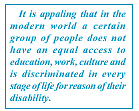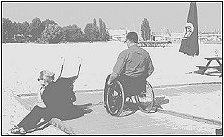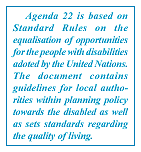Just
like us ...
The Council of the European Union has announced
the year 2003 the European Year of People with Disabilities
in order to draw attention of societies from the European
Community to the problems of the disabled and motivate them
to act for the benefit of people with disabilities. In this
way, countries of the European Community endeavour to create
proper conditions for the disabled, which will allow them
to feel a fully valuable part of Europe's civilization and
its cultural heritage. This year will also be a chance for
the disabled themselves to discuss their problems and show
the social potential they possess. The celebrations of European
Year of People with Disabilities may become a joint undertaking
of the government, self-governments and non-governmental
organisations as well as other social partners including
economical units. Thus these initiatives may be carried
out at local, regional, state and international levels.
It is highly alarming that in the modern
world a certain group of people does not have an equal access
to education, work, culture and is discriminated in every
stage of life the reason being their disability. Although
there exist many legal acts that should regulate the issue,
the regulations are not obeyed in reality. The disabled
live with the stigmata: disabled means worse and they remain
in the background satisfying only their fundamental needs.
 Therefore,
it is necessary to create a social policy in particular
countries, which will not divide the society into the bodily-able
and the disabled (as it is an artificial division) but will
take into consideration needs of every person. In case of
limited physical fitness (as the result of illness or accident),
one should be able to function again in normal life as soon
as possible. One should become again a citizen with full
rights and come back to professional activity and have a
chance to fulfil one's passions and dreams. Therefore,
it is necessary to create a social policy in particular
countries, which will not divide the society into the bodily-able
and the disabled (as it is an artificial division) but will
take into consideration needs of every person. In case of
limited physical fitness (as the result of illness or accident),
one should be able to function again in normal life as soon
as possible. One should become again a citizen with full
rights and come back to professional activity and have a
chance to fulfil one's passions and dreams.
The state should compensate disability by
means of legal system, provision of rehabilitation and orthopaedic
equipment, creation of infrastructure that would allow the
disabled to lead a normal and decent life. At the same time,
the above-mentioned factors will reduce the costs of living
of a disabled person, who will no longer be a social burden
but will make profits; and thus will become a taxpayer again.
Regional self-governments play a significant
role; since local authorities make decisions about daily
life, create reality and conditions of living for inhabitants
of a given region. Self-governments are basic units which
in cooperation with nongovernmental organisations of the
disabled and having the support of state law and policy,
are able to solve effectively problems of the disabled as
well as remove social and mental obstacles.
 European
Congress of People with Disabilities organised in Madrid
between 20-23.03.2003 was devoted to the activities to be
taken at different levels by European countries within the
celebrations of European Year of People with Disabilities.
Special emphasis was put on self-governmental activities
in different domains, taking into consideration specific
needs of the disabled. European
Congress of People with Disabilities organised in Madrid
between 20-23.03.2003 was devoted to the activities to be
taken at different levels by European countries within the
celebrations of European Year of People with Disabilities.
Special emphasis was put on self-governmental activities
in different domains, taking into consideration specific
needs of the disabled.
Self-governments should create and carry
out a social policy whose objective is to remove all the
obstacles that prevent the disabled from participating in
a normal and active life. Self-governments should exchange
experience, support new programmes and projects, as well
as implement verified solutions that have been consulted
with the disabled before. The disabled need more support
from a local society in order to obtain the same conditions
of living that other citizens are able to enjoy. This kind
of support cannot be treated as a privilege - it is a human
right. Self-governments are responsible for the quality
of life of all inhabitants of a given region.
The Swedish Disability Federation has compiled
the document Agenda 22 that contains guidelines for local
authorities within planning policy towards the disabled.
Agenda 22 is based on Standard Rules on the equalisation
of opportunities for people with disabilities adopted by
United Nations. The document is based on the idea of human
rights and conviction that the best results may be achieved
by the cooperation between local authorities and organisations
acting for the benefit of the disabled. Agenda 22 sets certain
standards regarding the quality of living of the disabled
and as well as modern thinking about a social policy, where
the rule of universal access is understood as universal
access in all aspects of life.
 The
city of Gdynia inaugurated Social Campaign Without Limits
within Union of the Baltic Cities (UBC) in September 2002. The
city of Gdynia inaugurated Social Campaign Without Limits
within Union of the Baltic Cities (UBC) in September 2002.
The objective of the campaign is to exchange
experience and carry out the projects regarding problems
of the disabled.
Questionnaires filled in by representatives
of 26 cities (from 8 countries) - members of UBC, have become
a basis for the evaluation of domains of cooperation among
self-governments. Two basic aspects that may create self-governmental
joint co-operation are job activation of the disabled and
care of people with mental handicap.
The year 2003 is thus a great challenge and
a chance to improve the quality of living of the disabled,
their education and to make the society more sensitive to
their problems. It is the year of setting the modern standards
of life and social norms. We hope that it will not be an
ephemeral phenomenon but a beginning of long-lasting, effective
changes. Our attitude towards the disabled and their problems
shows in what stage of life, development, feelings and consciousness
we are.
written by
Ms Beata Wachowiak-Zwara
e-mail: beatawz@wp.pl
*Beata Wachowiak-Zwara is a member of Honorary
Committee of Celebrations of European Year of People with
Disabilities under the auspices of the President of Poland
|